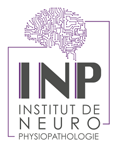The Alzheimer’s disease risk factor APOE4 drives pro-inflammation in human astrocytes via HDAC-dependent repression of TAGLN3
Résumé
The Apolipoprotein E4 ( APOE4 ) is the major allelic risk factor for late-onset Alzheimer’s disease (AD). APOE4 associates with a pro-inflammatory phenotype increasingly considered as critical in AD initiation and progression. Yet, the mechanisms driving an APOE4-dependent neuroinflammation remain unelucidated. Leveraging patient specific human induced Pluripotent Stem Cells (iPSCs) we demonstrate inflammatory chronicity and hyperactivated responses upon cytokines in human APOE4 astrocytes via a novel mechanism. We uncovered that APOE4 represses Transgelin 3 (TAGLN3), a new interacting partner of IκBα, thus increasing the NF-kB activity. The transcriptional repression of TAGLN3 was shown to result from an APOE4-dependent histone deacetylase (HDAC) activity. The functional relevance of TAGLN3 was demonstrated by the attenuation of APOE4-driven neuroinflammation after TAGLN3 supplementation. Importantly, TAGLN3 downregulation was confirmed in the brain of AD patients. Our findings highlight the APOE4-TAGLN3 axis as a new pathogenic pathway that paves the way for the development of therapeutics to prevent maladaptive inflammatory responses in APOE4 carriers, while placing TAGLN3 downregulation as a potential biomarker of AD.
Domaines
Sciences du Vivant [q-bio]
Origine : Fichiers produits par l'(les) auteur(s)
